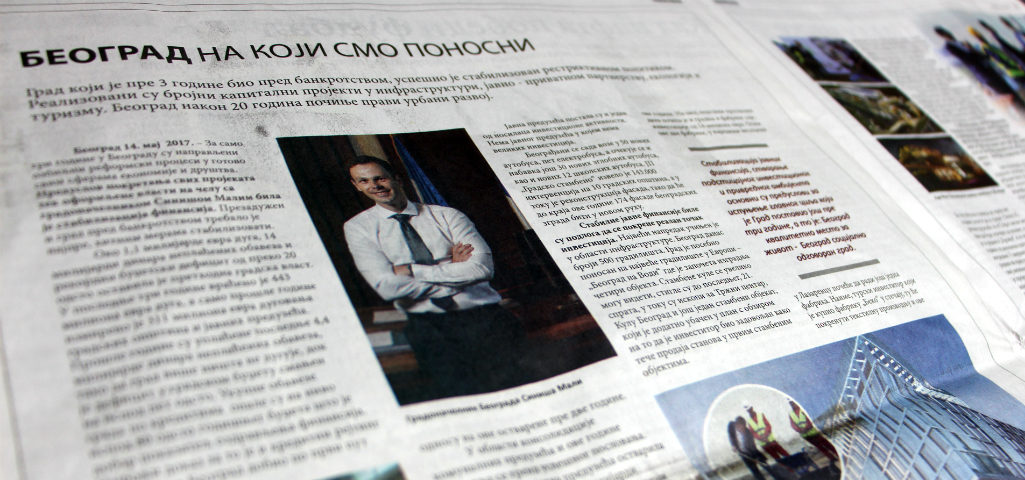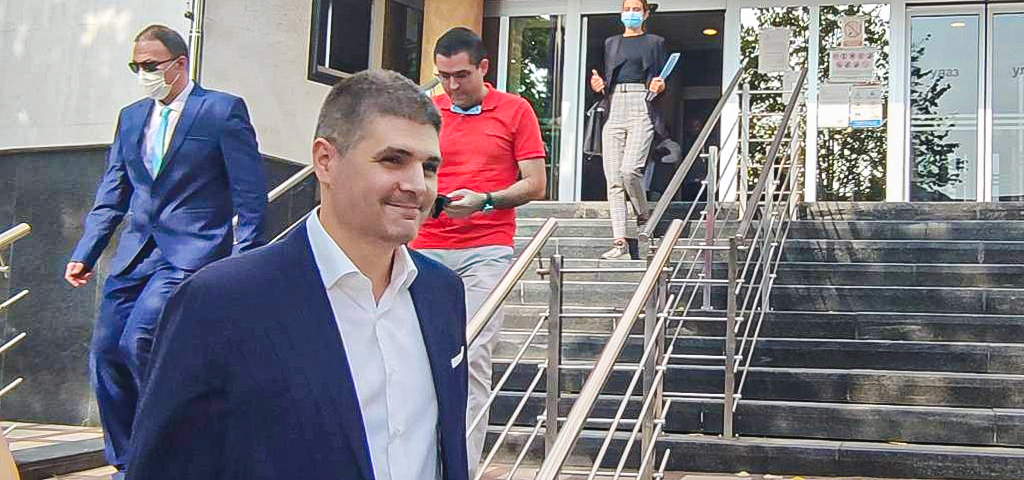Daily Paper Politika’s Deceiving Coverage of Belgrade Mayor Sinisa Mali
Daily Paper Politika’s Deceiving Coverage of Belgrade Mayor Sinisa Mali

Serbia’s oldest newspaper Politika published a laudatory two-page spread in May about Belgrade Mayor Sinisa Mali that disclosed in fine print this was a paid advertisement. Commentators told KRIK the inconspicuous disclaimer was a violation of journalistic ethics, but Politika’s acting editor in chief disagreed.
By Milica Vojinović
Politika published the article the month when Mali was to be removed from public office following a scandal-plagued term.
“City council and mayor Sinisa Mali will continue with ambitious projects to make Belgrade a better place to live,” the Sunday edition’s article read.
Titled “Belgrade, a city we are proud of,” the story touts the accomplishments of Mali and local politicians. Socio-economic improvements are highlighted such as the reduction of debt from when Mali first entered office in 2014. Construction projects from Belgrade’s Waterfront to newly opened shopping malls and the €1.8 million musical fountain recently erected in Slavija square were credited to Mali’s leadership.
Pictures show Mali greeting children in parks, unveiling new construction projects, and posing in front of 3D displays of unfinished buildings.
The promotional piece looks different from Politika’s other articles only by a box with fine print at the bottom of the pages. The editorial staff maintained that the nearly invisible message was a fair warning about the content’s nature.
Commentators that KRIK spoke to, however, claimed the publication misled its readers and transgressed journalistic ethics.
Concealed advertising
Tamara Skrozza, a journalist and member of the Press Council said that Politika should have been more explicit in presenting the story as a paid ad, and that the fine print did little to alert readers.
“The idea (of the Code of Ethics) is that the average reader should be able to distinguish a paid ad from other articles. That wasn’t done in this case.”
It is against the law for media to publish paid political ads without labeling them as such, lawyer Milos Stojkovic told KRIK.
“The law states that at a minimum advertisements must show disclaimers but it doesn’t specify how visible they must be,” he said.
Arandelovic claimed that KRIK’s story about Mayor Sinisa Mali omitted information, wasn’t thorough enough, and presented questionable details. Yet she didn’t give specific arguments to support her claims.
“If you don’t realize from that number [box at the bottom] that it is a paid message then it can’t be an identifier,” Stojkovic added.
Politika contended that by law, which overrides any code of ethics, it had done nothing wrong.
“Does the reader know or doesn’t he, can the reader read latin, cyrillic, does the reader notice photos only or reads sports only, we can talk about a lot of things,” Politika’s acting editor in chief, Zarko Rakic said.
“This is a situation where everything is clear. The boxed text at the bottom has a number. I don’t see anything wrong here.”
Rakic added that Politika’s diurnal readers can distinguish the difference between regular articles and ads.
“Do you think we have to worry about readers who buy Politika for the first time, well that doesn’t work like that,” Rakic said. “We take care of our long-term readers. And those ad hoc readers can surely see the difference too.”
Politika’s price to publish such an ad is more than 300,000 dinars, according to its advertising department.
KRIK asked Belgrade city council how much they spent to advertise Mali in Politika, and whose money they used. No response followed.



